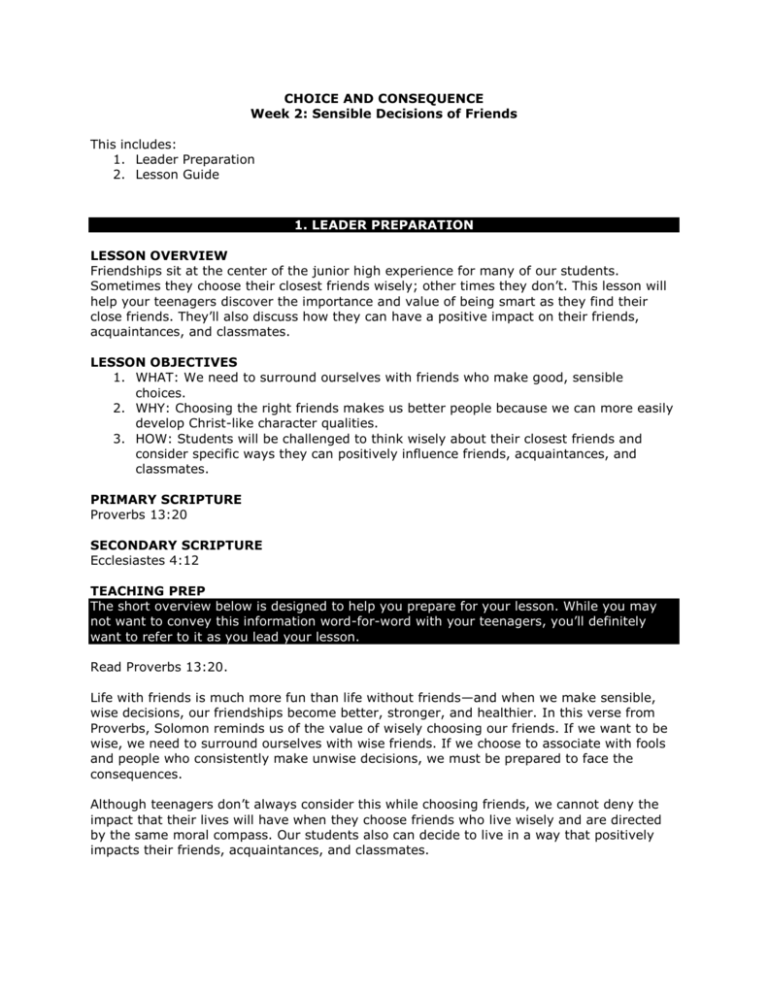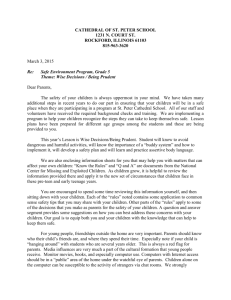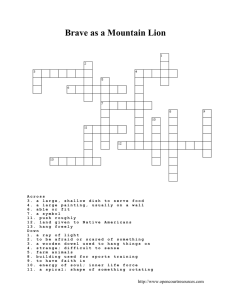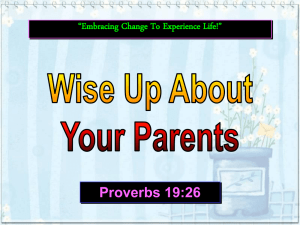choice and consequence Week 2: Sensible Decisions of Friends
advertisement

CHOICE AND CONSEQUENCE Week 2: Sensible Decisions of Friends This includes: 1. Leader Preparation 2. Lesson Guide 1. LEADER PREPARATION LESSON OVERVIEW Friendships sit at the center of the junior high experience for many of our students. Sometimes they choose their closest friends wisely; other times they don’t. This lesson will help your teenagers discover the importance and value of being smart as they find their close friends. They’ll also discuss how they can have a positive impact on their friends, acquaintances, and classmates. LESSON OBJECTIVES 1. WHAT: We need to surround ourselves with friends who make good, sensible choices. 2. WHY: Choosing the right friends makes us better people because we can more easily develop Christ-like character qualities. 3. HOW: Students will be challenged to think wisely about their closest friends and consider specific ways they can positively influence friends, acquaintances, and classmates. PRIMARY SCRIPTURE Proverbs 13:20 SECONDARY SCRIPTURE Ecclesiastes 4:12 TEACHING PREP The short overview below is designed to help you prepare for your lesson. While you may not want to convey this information word-for-word with your teenagers, you’ll definitely want to refer to it as you lead your lesson. Read Proverbs 13:20. Life with friends is much more fun than life without friends—and when we make sensible, wise decisions, our friendships become better, stronger, and healthier. In this verse from Proverbs, Solomon reminds us of the value of wisely choosing our friends. If we want to be wise, we need to surround ourselves with wise friends. If we choose to associate with fools and people who consistently make unwise decisions, we must be prepared to face the consequences. Although teenagers don’t always consider this while choosing friends, we cannot deny the impact that their lives will have when they choose friends who live wisely and are directed by the same moral compass. Our students also can decide to live in a way that positively impacts their friends, acquaintances, and classmates. THE BEFORE & AFTER [optional] Text Message Questions We’ve provided a couple of different text message questions to send out to your students prior to your meeting. Feel free to use one or both of the questions below. As with the rest of the curriculum, edit these questions to fit the needs of your ministry. What do you like most about your closest friends? Let’s talk about it tonight at small group. What are some ways you’re influencing the friends in your life? Come to small group tonight to share your thoughts. Parent Email We’ve provided you with an email below that you can send to your parents following the lesson. Our hope is to encourage parents to continue the conversation at home. Feel free to edit and customize the email to fit your ministry needs. Dear parents, Our small groups wrapped up their two-week series on “Choice and Consequence” by discussing the importance of wisely choosing friends. Life with friends is much more fun than life without friends—and when we make sensible, wise decisions, our friendships become better, stronger, and healthier. In Proverbs 13:20, Solomon reminds us of the value of wisely choosing our friends. If we want to be wise, we need to surround ourselves with wise friends. If we choose to associate with fools and people who consistently make unwise decisions, we must be prepared to face the consequences. Although teenagers don’t always consider this while choosing friends, we cannot deny the impact that their lives will have when they choose friends who live wisely and are directed by the same moral compass. Here are some questions you might want to incorporate as you talk with your teenager about this week’s lesson: Why do we become like the people we hang out with the most? How can this be a good thing, and how can this be a bad thing? Do you find it hard to choose the right friends? Why or why not? What are some ways your choices and lifestyle can positively influence your friends— particularly friends who aren’t followers of Jesus? Thanks for your prayers for our ministry. Have an awesome week! CHOICE AND CONSEQUENCE Week 2: Sensible Decisions of Friends 2. LESSON GUIDE GETTING THINGS STARTED [optional] Welcome your students and invite them into your meeting area. Open in prayer, and then ASK: What are three ways life is better with friends? Think about the people you consider your closest friends. What are two or three attributes or character qualities you think are required to call someone a close friend? What are some ways you’re a good friend to other people? SAY SOMETHING LIKE: Life with friends is much more fun than life without friends—and when we make sensible, wise decisions, our friendships become better, stronger, and healthier. In our last lesson, we talked about sensible decisions at school, and today we take that same idea and examine our friendships. If you came up with an opening activity, movie clip, or game that worked well with your group, and you’d like to share it with other youth workers, please email us at ideas@simplyyouthministry.com. TEACHING POINTS The goal of the Teaching Points is to help students capture the essence of each lesson with more discussion and less lecture-style teaching. The main points we have chosen here are (1) You become like the people you hang out with the most, (2) True friends play a special role in your life, and (3) You can encourage your friends to grow and excel. Remember: All throughout these lessons, it’s up to you to choose (1) how many questions you use, and (2) the wording of the main points—keep ours, or change the wording to make it clearer for your audience. Read Proverbs 13:20 together as a group. Consider allowing one or more of the teenagers to read the text. SAY SOMETHING LIKE: Let’s spend a few minutes talking about why it is important to choose the right kinds of friends—and to BE the right kind of friend. 1. You become like the people you hang out with the most ASK: Give us some funny examples of traits or habits that you and your closest friends share? [NOTE: This could include the way they walk, the way they dress, the way they talk, and so on.] Why do we become like the people we hang out with the most? How can this be a good thing, and how can this be a bad thing? If you constantly choose friends who make bad decisions and choose to do something wrong over doing something right, how might this shape you? What do you think that it means to be wise? How would you describe a fool? Why is it better to be around “wise” friends instead of “foolish” ones? If we read Proverbs 13:20 and believe its words are true, why do we still sometimes choose to associate with people who make foolish choices—even though it might get us into trouble? SAY SOMETHING LIKE: If you hang out with people who criticize and verbally attack other people, you’ll probably start to act the same way. If you hang out with people who disrespect authority and break every rule they can, you’ll probably start to make similar choices—and you may find yourself getting into trouble a lot. But if you surround yourself with other teenagers who make wise choices, who love God, who are kind and compassionate, and who encourage others with their words, you’ll probably start acting this way, too. You have to power to shape the person you will become, based on the people you hang out with most often. 2. True friends play a special role in your life ASK: We talked earlier about some of the character qualities we see among our closest friends. How do you know if someone is a true friend, instead of just an acquaintance or a classmate? Many people would say that a true friend is someone who knows the very worst about you and still loves you and wants the best for your life. If that’s true, why do many of us still have people we call close friends who are mean to us and treat us unfairly? Should we be spending much time with people like that? Explain. How do good friends protect and support you? Do you find it hard to choose the right friends? Why or why not? SAY SOMETHING LIKE: Friends are a huge part of your life. God desires you to build relationships with other people who will help you grow into the men and women he wants you to become. Choosing the right friends who make good choices and want the best for you can help you develop Christ-like character qualities and live well. 3. You can encourage your friends to grow and excel SAY SOMETHING LIKE: I don’t want you to walk away from our conversation today thinking that this means you shouldn’t have any friends who aren’t Christians. God wants us to spend time with people who haven’t yet made the decision to follow Jesus. Otherwise, they may never discover the joy and purpose and love we’ve found in Jesus! But when you’re around friends who aren’t Christians, look for ways for YOU to have a positive impact on THEM. ASK: What are some ways your choices and lifestyle can positively influence your friends— particularly friends who aren’t followers of Jesus? Jesus spent a lot of time around people who made poor choices, yet he wasn’t drawn into their patterns or lifestyles. Obviously, Jesus was God, but what can we learn from him about how to influence people without being negatively influenced? ADDITIONAL DISCUSSION [optional] ASK: Without telling us the person’s name, think about a friend in the past that wasn’t a good influence on you. What convinced you to get away from that relationship? Ten years from now, do you think that you will still be friends with the people you currently consider your closest friends? Why or why not? Do your parents have strong friendships that they have developed over time? Why do you think that they are still friends with these individuals after so many years? Read Ecclesiastes 4:12. How might you explain this verse in a way that would make more sense to your peers? How could a good friend help you conquer life? How can the words of this verse influence the way you choose your closest friends? APPLICATION Ask each student to find a partner for these questions. ASK: If you gave yourself a letter grade in selecting friends, what grade would you give yourself? What steps can you take to raise your grade in the subject of “selecting friends?” Is there someone that you know who would make a good friend but for some reason you are hesitant to reach out to them and make a connection? What steps might you take this week? How can you be a better influence on your friends, acquaintances, and classmates? How can you be a more Christ-like example? SAY SOMETHING LIKE: This week, I’d like to challenge you to make an effort to get to know someone new—especially someone who has a solid reputation on campus or at church. Watch that person and the ways he or she interacts with others. Ask God to inspire you to be more like this person and to choose friends who are a light in this world. SUMMARY End your small group lesson here. Provide your teenagers with a quick summary or takehome challenge based on (1) the content of this lesson, (2) the dialogue that took place during the lesson, (3) your understanding of the issues and struggles your teenagers are facing, and (4) the big picture of your youth ministry and what your leadership team wants accomplished with the teaching and discussion time. FOR KEEPS [MEMORY VERSE] Encourage and/or challenge your teenagers to memorize the verse below. Walk with the wise and become wise; associate with fools and get into trouble (Proverbs 13:20).





